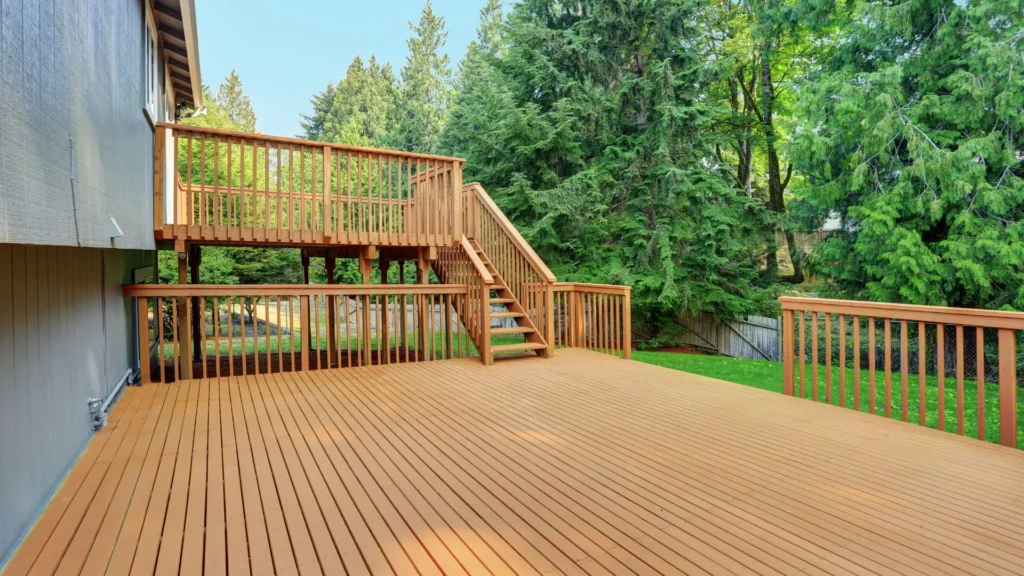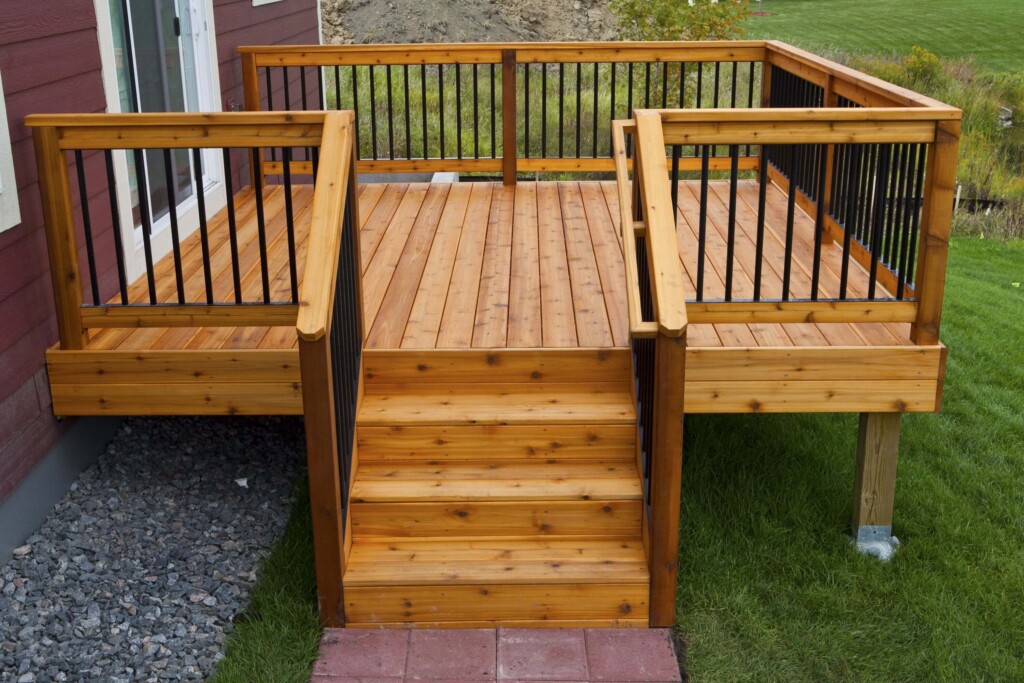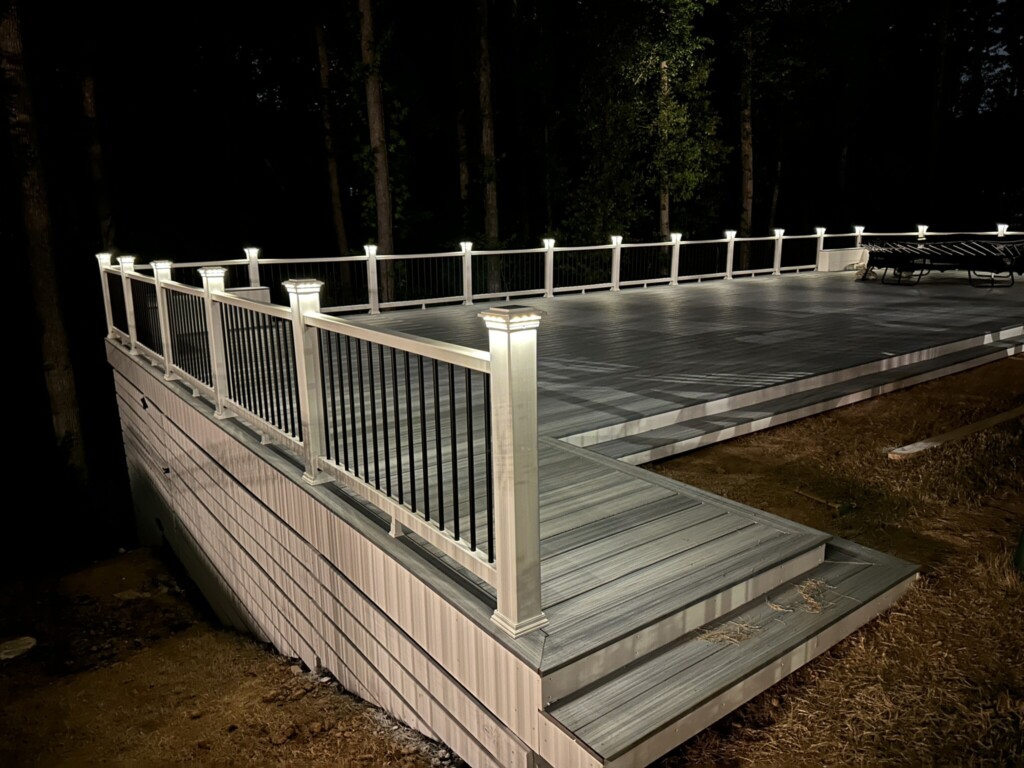A new deck is more than an outdoor upgrade. It’s an investment that helps Raleigh-area homeowners enjoy North Carolina’s sunshine in style. Before you imagine family barbecues or relaxing at sunset, there’s an important choice: composite or wood decking? Each brings its own strengths and quirks, and the right pick can mean years of easy living—or, all too often, surprise repairs and regret.
From Oakwood to Cary, the best deck goes beyond price or looks. It needs to handle Raleigh’s humidity, summer storms, and HOA rules. This guide breaks down every angle: initial cost, ongoing maintenance, lifespan in our local climate, neighborhood requirements, and which deck style nails the look you want. The goal? Clear answers, real numbers, and the confidence to build the backyard of dreams—with zero regrets.
Let’s dig into the knowledge we’ve built building decks for the last 15 years in Raleigh: composite vs wood deck, the complete comparison for North Carolina in 2025.
Composite Decking Overview

Composite decking combines recycled wood fibers and plastics. It merges modern technology with traditional outdoor fun. Top brands in Raleigh, like Trex and TimberTech, provide boards that last longer and work better than natural wood, year after year. These materials are valued for their durability. They resist fading, staining, and wear from the unpredictable North Carolina weather.
The appeal is clear: composite decks need little maintenance. Just rinse them regularly and use a specialty cleaner now and then to keep the boards looking fresh. Colors stay vibrant thanks to UV stability, and there’s no yearly sanding, staining, or sealing. Composite boards are built to resist mold, insects, and warping, which is essential for humid summers and sudden storms. Top brands offer fade and stain warranties lasting 25 to 50 years. This turns maintenance worries into easy, carefree living.
We’ve seen many homeowners in Renaissance Park choose composite means investing upfront. This leads to hassle-free outdoor living, where you can relax instead of repainting.
Wood Decking Overview

Natural wood decking is a top choice for Raleigh homeowners. Its warmth and timeless look attract many.
The most popular choices are:
- Pressure-treated pine is recognized for its affordability and ease of workability.
- Classic options like cedar and redwood, which offer beautiful colors and naturally resist insects.
Each species has its own charm. Softer pine is great for modest budgets. In contrast, hardwoods like ipe provide luxury and last longer for those willing to invest.
Wood decks are beloved for their traditional look and feel—no two boards are alike, and the real wood grain creates a custom, inviting space. In North Carolina, wood is a popular material. Homeowners love it for its vintage Southern porch charm. It also complements lush, mature landscapes well. There’s unmatched potential for customization through stains and finishes, allowing each homeowner to tailor their deck to match their home’s style and personality.
With wood, a little TLC goes a long way. Regular cleaning, annual sealing, and periodic repairs are essential for managing Raleigh’s humid summers and heavy storms. Real wood is more challenging to care for than composite, but its charm makes it worthwhile. It feels cool, smells nice, and has a classic look. Many people who want a genuine feel in their backyard find this appealing.
Cost Breakdown

When planning a new deck in Raleigh, cost factors extend well beyond just materials.
Composite decking usually costs more upfront than wood. This cost reflects its strong durability and promise of low maintenance. For this reason we see composite decks installed regularly in Five Points, Hayes Barton, and Oakwood. Wood decks, such as those made from pressure-treated pine or cedar, are initially less expensive. However, they need more care over time.
Labor costs change based on project complexity. Custom designs, multilevel layouts, and features like railings and built-in lighting can raise costs. Site conditions and permits in North Carolina can affect the price. So, it’s wise to get a custom quote from a local expert familiar with Raleigh’s rules and homeowner associations.
Over time, composite and wood decks reveal different cost personalities. Composite costs more to install at first. However, maintenance and repair costs are much lower. By contrast, wood’s lower upfront cost is balanced by regular sealing, staining, and possible board replacements. Investing wisely means considering both short-term and long-term finances. You should also choose a deck that fits your lifestyle and local conditions.
Some contractors make it easy to work with them by offering a price-match guarantee. AAA Fence and Deck has been helping homeowners get the best decks at the best price for years – give him a call today for your free estimate!
Who gets the edge: Composite is more expensive up front. Wood is more expensive long term.
Durability and Lifespan

Composite decking excels in Raleigh’s climate. Even with the humidity and storms material manufacturers warranty it for 25 or 30 years. Composite is a great choice for North Carolina’s weather. It resists decay, insects, fading, and warping. This makes it perfect for steamy summers and rare cold snaps. High-quality composite brands add a protective cap to their boards. This keeps moisture out and keeps color bright for years.
Wood decks are extremely charming and, if treated correctly, they can last a long time. But their lifespan relies on the right materials and good upkeep. Pressure-treated pine typically lasts 10–15 years, cedar up to 20 years, and premium hardwoods even longer with proper care. In Raleigh, the Southern climate challenges natural wood. The hot sun, afternoon storms, and constant humidity can cause rot, splintering, or insect problems if maintenance is ignored. Annual sealing, prompt repairs, and routine inspections are essential to protect the beauty and structure of wood for the long term.
For homeowners in North Carolina, composite seems to be the most popular choice. It lasts long and needs little upkeep in our humid climate. This makes it a durable and low-stress option for your deck. Wood, though, can offer decades of service and unique character, provided it gets the care it deserves.
Who gets the edge: Composite
Appearance and Design Flexibility

Composite decking offers a sleek, modern appearance and can also mimic traditional wood grain. It ensures consistent color and texture across each board. Homeowners can choose from many colors. They can pick cool grays, rich browns, deep charcoals, or warm tans. This variety makes it easy for any deck to match the home’s style. Raleigh’s best composite brands use UV-resistant finishes. These keep colors bright and reduce fading from the strong North Carolina sun. So, composite is a smart choice for anyone wanting a modern, low-maintenance backyard.
Wood decks are celebrated for their authentic, one-of-a-kind beauty. Each plank is unique, with grain pattern, knots, and color variations that give outdoor spaces natural character. Wood decks start with bright colors like honey pine or reddish cedar. Over time, if not finished, they turn a silvery-gray shade. This change happens faster in the strong sun of a Southern summer. Homeowners can easily change the look of a wood deck. They can sand, stain, or paint it. This allows for endless customization options. This makes wood the go-to for those who want creative freedom and value organic warmth.
Ultimately, both materials offer plenty of design flexibility. Composite offers a smooth, consistent look and easy maintenance. Wood, on the other hand, has a unique character and can be customized. This lets homeowners design their deck to fit their changing styles and North Carolina landscapes.
Who gets the edge: Wood Decks (but it’s very close)
Environmental Impact

Composite decking steps confidently into the Raleigh sustainability conversation. Many top brands use a lot of recycled plastics and reclaimed wood fibers in their boards. This turns waste into outdoor spaces that can be enjoyed for years. Homeowners can cut landfill waste and reduce the need for new lumber by choosing composite materials. Longer lifespans mean fewer boards are thrown away. Also, the no-stain, no-seal routine avoids harsh chemicals. These chemicals often wash into Carolina soil after summer storms.
Wood, though classic, brings its own set of eco-questions. Responsibly harvested lumber, like FSC-certified pine or cedar, is renewable. It can also be biodegradable when its journey ends. Locally sourced wood has a smaller carbon footprint. This helps support forestry jobs and community green projects. To handle Raleigh’s moisture and sunlight, most wood decks need chemical treatments and regular coatings. These have environmental costs that add up over time. For those prioritizing sustainability, it pays to ask where the wood comes from and how it’s treated.
Either material can be a solid green choice, provided it matches both personal values and regional realities.
Which gets the edge: Composite
Suitability for North Carolina Conditions

Let’s talk about Raleigh specifically. The best material for Raleigh has to endure the humidity, heat, and the occassional freeze. In our opinion, the best fit for this varying challenge is composite decks.
Composite decking uses advanced materials that resist fading, staining, and wear. Its low-absorption surface blocks moisture. Plus, modern UV protection keeps Raleigh’s bright sun from fading vibrant colors. These decks keep their shape and look with little yearly upkeep. This makes them a great choice for homeowners seeking a dependable, long-lasting option for North Carolina’s unpredictable weather.
Wood is still a beautiful and potential option. We will always steer homeowners away from cheaper, untreated options as they simply will not last. However, pressure-treated pine, cedar, and rich hardwoods can do well if sealed properly and mantained every year. The problem is always moisture. Water can get into the grains of the wood and cause it to warp, mold, or even crack. Best practices are regular cleaning, sealing, and spot checks after storms. These steps keep decks strong and beautiful, protecting them from heavy rain and constant sun. Trimmed trees, quick leaf cleanup, and smart placement away from standing water help Raleigh wood decks withstand the elements.
With either choice, local craftsmanship and seasonal care will turn your deck into a weather-tested retreat you’ll enjoy for years.
Which gets the edge: Composite.
Composite vs Wood Decking: Raleigh Head-to-Head
Below is a quick-reference table that captures the big differences (and key similarities) between composite and wood decking for Raleigh homeowners.
| Feature | Composite Decking | Wood Decking |
| Appearance | Consistent color and texture, modern or wood-look | Natural warmth, unique grain, ages to silver patina |
| Maintenance | Hose down and gentle cleaner, no sanding or sealing | Annual cleaning, regular sealing, repairs as needed |
| Durability | Highly resistant to rot, insects, fading, and warping | Vulnerable to rot, splitting, and insects if neglected |
| Lifespan | 25–30+ years with minimal effort | 10–20+ years (depends on type and care) |
| Environmental Impact | High recycled content, long lifespan | Renewable if FSC-certified, biodegradable but needs chemicals |
| Cost Structure | Higher upfront, lower ongoing maintenance | Lower initial, higher long-term maintenance |
| Design Flexibility | Wide range of colors, uniform finish | Unlimited stain/paint options, fully customizable |
| Best for Raleigh? | Low maintenance, reliable, color-stable | Natural charm, for those who love project upkeep |
This side-by-side view makes it easier to match deck choices to real-life priorities and local climate realities.
Ready for your deck installation in Raleigh?
Ready to take the next step toward your dream outdoor space? Call AAA Fence Deck today for a personalized consultation—our Raleigh-based team specializes in designing, permitting, and building decks that fit your style, budget, and HOA requirements. Whether you’re still deciding between composite and wood or want expert advice tailored to North Carolina’s climate, we’re here to turn your vision into a backyard retreat built to last.
FAQ:
How do composite and wood decks compare in terms of cost?
Composite decks generally require a larger upfront investment, but their long-term maintenance expenses are much lower compared to wood. Wooden decks cost less initially, but over time, the need for staining, sealing, and replacement can make the total investment comparable for Raleigh homeowners.
What’s involved in maintaining each type?
Composite decking is prized for its low maintenance—routine cleaning with soap and water keeps it looking fresh. Wood decks, however, need annual cleaning, regular sealing, and monitoring for loose boards or signs of rot to handle Raleigh’s wet summers and fluctuating temperatures.
Which deck lasts longer in our climate?
Homeowners in the Triangle prefer composite for longevity—it typically endures for 25 to 30 years or more, even with minimal attention. Wood can last a decade or two with dedicated care, though premium hardwoods fare better. The difference comes down to upkeep, local weather, and material quality.
Are composite or wood decks better for the environment?
Many composites are made from recycled materials, offering a sustainable solution with a long lifespan and fewer chemical treatments. If using wood, choose certified, responsibly harvested lumber and be mindful of treatments that impact local ecosystems.
How long does installation take?
A typical deck build in Raleigh can take from one to three weeks, depending on factors like weather, project complexity, and permitting. Fast approvals and clear plans can speed up the timeline, whether you opt for composite or wood.
